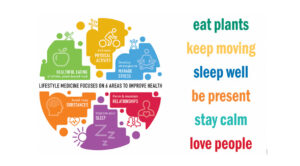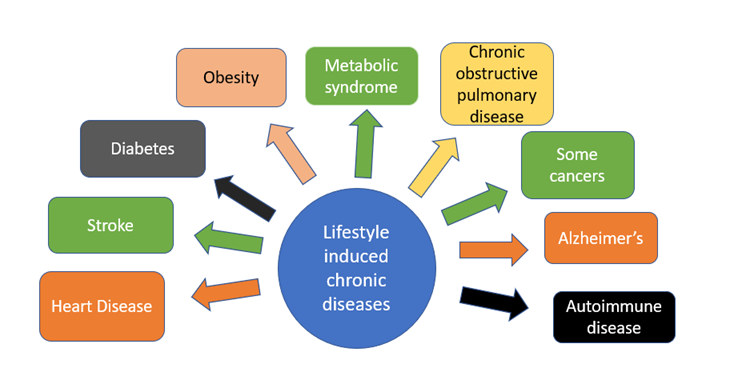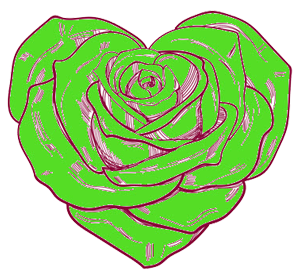Lifestyle medicine is the concept that modifying your daily habits (lifestyle) can serve as medicine to improve your health condition.
Often times improving your overall health can reduce your pain by decreasing your sensitivity to it.
Lifestyle Medicine categorizes health-influencing behaviors into six key areas. These six pillars of a healthy life are:
- Nutrition
- Exercise or Movement
- Restorative Sleep
- Stress Management
- Positive Social Relations
- Avoiding Risky Substances
Studies have shown that improving your health in any of these areas can reduce your pain sensations.
Being mindful of your choices and behaviors in these areas can significantly impact your overall health and well-being.

Embracing the beneficial habits outlined in the six pillars of Lifestyle Medicine can:
- Prevent lifestyle diseases
- Alleviate symptoms of existing conditions
- Often reverse the progression of lifestyle-related illnesses
- And if you are suffering with chronic pain, adopting these healthy habits can increase your comfort level.
Moreover, these practices can significantly improve the quality of life for individuals facing non-lifestyle related challenges, including trauma, disability, and chronic pain.
Click for Explanation by American College of Lifestyle Medicine

The key difference is that Lifestyle Medicine puts you in the driver's seat:
- It can't be done for you. It must be done by you.
- Traditional approaches: • Car breaks down? The mechanic fixes it. • You get sick? Doctors prescribe or operate.
- Lifestyle Medicine approach: • You control your actions. • You change your habits. • Your body makes the repairs.
- You don't have to wait for or rely on a doctor to ease your pain. There are things you can do yourself to increase your comfort.
And here's the truth: It's not easy.
But it is empowering. You become the primary agent of your own health and well-being.
"It's not easy to look in the mirror and change your own life ... you have to take responsibility. You have to learn new things. You have to feel uncomfortable ... because discomfort is how we grow. That's how we become strong." - Arnold Schwarzenegger

Make lifestyle changes incrementally. There’s no need to rush – these changes are for life.
Exercise:
- If sedentary, don’t start with a marathon, begin with daily walks.
- Once walking becomes habit, consider jogging or running if you enjoy it.
- Remember: Most exercise benefits don’t depend on intensity.
- Always check with your health care provider before beginning an exercise program.
Enhance enjoyment:
- Walk with a dog or friends
- Greet fellow walkers
- Give compliments to boost your own mood
-

If you are just starting to add movement you may incur DOMS (delayed onset muscle soreness) the next day. This is different from a flare-up. Please be aware the DOMS is temporary and your muscles are actually getting stronger at this time.
Dietary Fiber
- Introduce one high-fiber food at a time.
- Monitor for any negative reactions.
- Avoid sudden, large increases in fiber intake to prevent bloating.
- Gradually increase fiber in your diet.
- Consistency is key.
- Increasing fiber in your diet can boost serotonin, the mood stabilizer, which can help alleviate chronic pain.
The takeaway:
Small, sustainable changes lead to significant long-term benefits. Be patient with yourself and focus on building lasting habits.
- Lifestyle's Impact on Health: • Many chronic diseases stem directly from our daily habits. • Lifestyle diseases are becoming more prevalent. • The age of onset for these conditions is decreasing.
- Having a lifestyle illness in conjunction with chronic pain is especially challenging.
- Personal Financial Risk: • Medical debt is the leading cause of personal bankruptcy in the U.S.
- The Economic Burden: • U.S. annual healthcare spending exceeds $3 trillion. • Over 80% of this expenditure is allocated to lifestyle diseases.
This sobering reality underscores the urgent need for preventive measures and lifestyle modifications to improve public health and reduce financial strain on individuals and the healthcare system.
American Action Forum - Chng Health and Economic Crisisronic Disease: A Worseni

